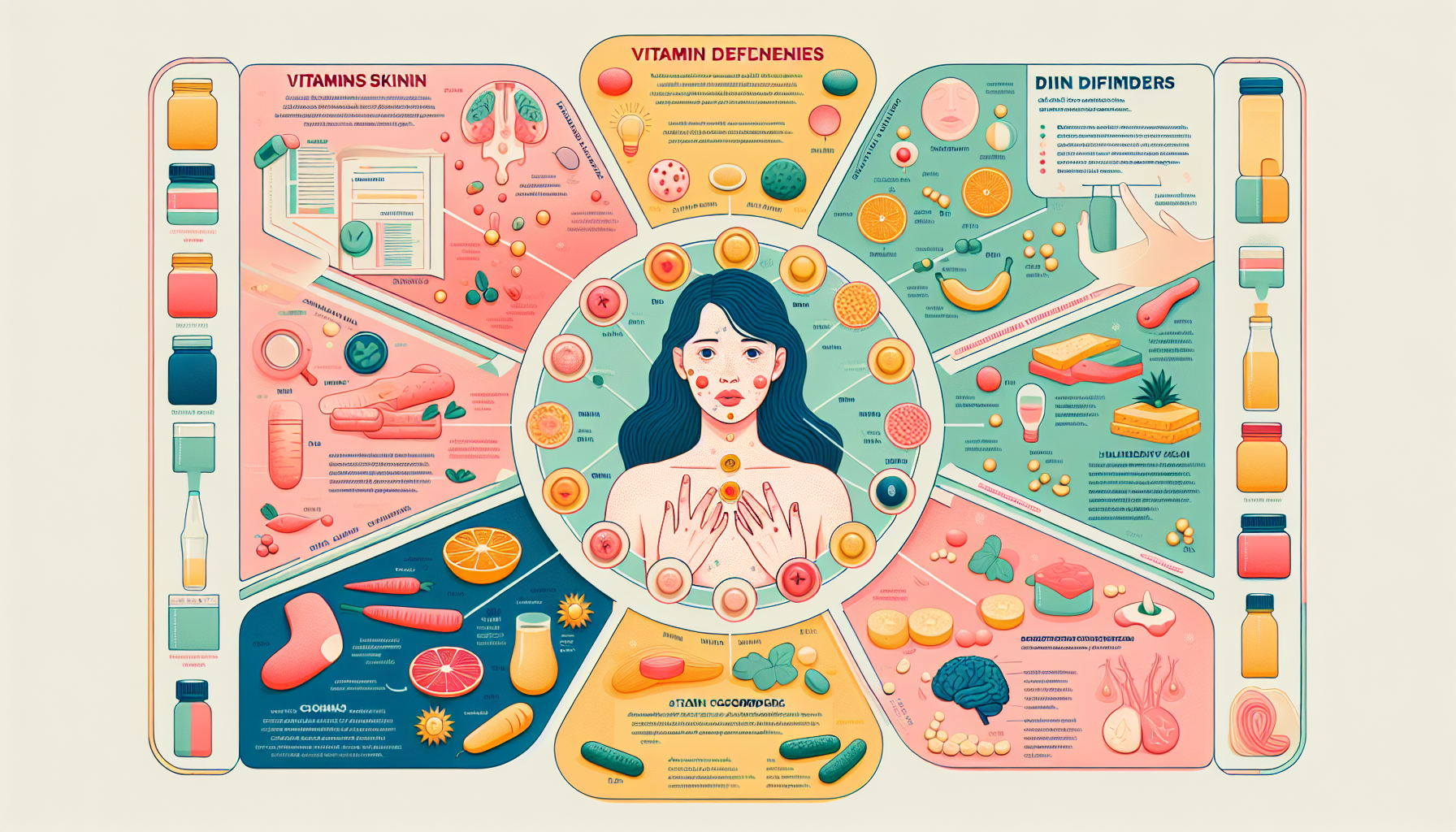Did you know that what you eat can have a direct impact on the health of your skin? Recent scientific studies have shown that a diet lacking in vitamins can potentially lead to various skin disorders. For example, a study published in the Journal of Investigative Dermatology found that deficiencies in vitamins A, C, D, and E were associated with an increased risk of developing acne. Another study in the Journal of the American Academy of Dermatology revealed that inadequate intake of vitamin B-complex vitamins could exacerbate symptoms of eczema. These findings highlight the importance of maintaining a balanced diet to keep your skin healthy and radiant.
Discover the Ultimate Weight Loss Secrets Here!
Importance of Vitamins for Healthy Skin
Your skin is the largest organ of your body and plays a crucial role in protecting you from external factors such as bacteria, pollution, and harmful UV rays. To keep your skin healthy and vibrant, it is important to provide it with the essential nutrients it needs, including vitamins. Vitamins play a key role in maintaining the health of your skin by promoting various processes and functions that contribute to its overall well-being.
Role of Vitamins in Skin Health
Vitamins are vital for your skin’s health as they act as antioxidants, aid in collagen production, and help repair and protect your skin from damage. Let’s take a closer look at the role of some key vitamins in promoting healthy skin.
Effects of Vitamin Deficiency on Skin
A diet lacking in vitamins can impact the health and appearance of your skin. Vitamin deficiencies can manifest in a variety of ways and may contribute to the development of certain skin disorders. Studies have shown that deficiencies in specific vitamins can lead to changes in the structure and function of your skin, making it more susceptible to various skin conditions.
Scientific Studies on the Impact of Vitamin Deficiency on Skin
Several scientific studies have been conducted to investigate the impact of vitamin deficiency on skin health. One study published in the Journal of Investigative Dermatology found that a deficiency in vitamin C led to impaired wound healing and increased susceptibility to infections in animal models. Another study published in the American Journal of Clinical Nutrition demonstrated that a deficiency in vitamin D was associated with an increased risk of developing acne in young individuals.
Specific Vitamins and their Effects on Skin
Vitamin A
Vitamin A is essential for maintaining healthy skin. It promotes cell turnover, helps regulate oil production, and aids in the repair and maintenance of skin tissues. Vitamin A can help reduce the appearance of wrinkles and improve uneven skin tone.
Vitamin D
Vitamin D plays a crucial role in skin health. It helps regulate the immune system, reduces inflammation, and promotes the formation of new skin cells. Adequate levels of vitamin D can help prevent skin conditions such as psoriasis and eczema.
Vitamin E
Vitamin E is a powerful antioxidant that helps protect your skin from damage caused by free radicals. It also aids in the repair of damaged skin cells and promotes healthy skin regeneration. Vitamin E is known for its moisturizing properties and can help soothe dry and irritated skin.
Vitamin C
Vitamin C is essential for collagen production, which is responsible for the structure and elasticity of your skin. It also acts as an antioxidant, helping to protect your skin from sun damage and oxidative stress. Regular intake of vitamin C can help reduce the appearance of fine lines and wrinkles.
B Vitamins
B vitamins, including B2, B3, B5, and B6, are crucial for healthy skin. They help regulate oil production, promote skin cell turnover, and maintain the integrity of your skin barrier. B vitamins also play a role in reducing inflammation and preventing skin conditions such as acne.
Click Here for Proven Fat-Burning Strategies!
Common Skin Disorders Caused by Vitamin Deficiency
Acne
Vitamin deficiencies, particularly in vitamin A and D, have been linked to the development of acne. These vitamins play a role in regulating oil production, reducing inflammation, and maintaining the health of your skin cells. Lack of these vitamins can lead to an overproduction of sebum and clogged pores, contributing to the formation of acne.
Dry Skin
A deficiency in vitamin E can result in dry and flaky skin. Vitamin E helps moisturize and nourish your skin, preventing moisture loss and promoting hydration. Without sufficient vitamin E, your skin may become dry, rough, and prone to irritation.
Eczema
Studies have shown a correlation between vitamin D deficiency and the development of eczema, a chronic inflammatory skin condition. Vitamin D helps regulate the immune system and fight inflammation, and a deficiency can contribute to the development and exacerbation of eczema symptoms.
Psoriasis
Psoriasis is an autoimmune skin condition characterized by red, scaly patches. Research has indicated that deficiencies in vitamins A, D, and E can play a role in the development and severity of psoriasis. These vitamins help regulate the immune system, reduce inflammation, and support healthy skin cell turnover.
Effects of Vitamin Deficiency on Wound Healing
Delayed Wound Healing
Vitamin deficiencies, particularly in vitamin C, can significantly impact the healing process of wounds. Vitamin C is essential for collagen production, which is a key component of wound healing. Without sufficient vitamin C, the formation of new blood vessels and the synthesis of collagen can be impaired, leading to delayed wound healing.
Increased Risk of Infection
Vitamin C deficiency can also increase the risk of infection in wounds. This vitamin plays a crucial role in supporting the immune system, helping to prevent infections. A deficiency in vitamin C weakens the immune response, making the body more susceptible to infection and hindering the healing process.
Unlock Your Path to a Healthier You!
Vitamin Deficiency and Aging of the Skin
Wrinkles and Fine Lines
Vitamin deficiencies, particularly in vitamins C and E, can contribute to the development of wrinkles and fine lines. These vitamins are powerful antioxidants that help protect your skin from free radical damage. Without adequate amounts of these vitamins, your skin is more prone to oxidative stress, leading to premature aging signs.
Loss of Elasticity
Vitamin deficiencies, such as a lack of vitamin A and C, can result in a loss of skin elasticity. These vitamins play a crucial role in collagen production, which is responsible for maintaining the firmness and elasticity of your skin. Without sufficient amounts of these vitamins, your skin may become saggy and lose its youthful appearance.
Hyperpigmentation
Vitamin deficiencies, particularly in vitamin C, can contribute to the development of hyperpigmentation. Vitamin C helps regulate the production of melanin, the pigment responsible for skin color. Insufficient vitamin C can lead to an overproduction of melanin, resulting in dark spots and uneven skin tone.
Tips for Maintaining a Well-Balanced Diet for Healthy Skin
To ensure your skin receives an adequate supply of essential vitamins, it is important to maintain a well-balanced diet. Here are some tips to consider:
Include a Variety of Fruits and Vegetables
Fruits and vegetables are rich sources of vitamins and antioxidants. Aim to incorporate a variety of colorful fruits and vegetables into your daily meals to ensure you are receiving a wide range of essential nutrients for your skin.
Consume Adequate Amounts of Lean Protein
Protein is essential for the synthesis of collagen, which is vital for maintaining healthy skin. Include lean sources of protein, such as fish, poultry, tofu, and legumes, in your diet to support your skin’s health and repair processes.
Choose Whole Grains Over Refined Carbohydrates
Whole grains, such as brown rice, quinoa, and whole wheat bread, are rich in B vitamins and fiber. Opt for whole grains instead of refined carbohydrates to provide your skin with the necessary nutrients for optimal health.
Avoid Excessive Alcohol and Caffeine
Excessive consumption of alcohol and caffeine can dehydrate your skin and disrupt its natural balance. Limit your intake of these substances and ensure you stay adequately hydrated by drinking plenty of water throughout the day.
Consider Vitamin Supplements
If you struggle to meet your daily vitamin requirements through your diet alone, consider incorporating high-quality vitamin supplements into your routine. Consult with a healthcare professional to determine the right supplements for your specific needs.
Conclusion
Vitamins play a crucial role in maintaining the health and appearance of your skin. Deficiencies in specific vitamins can lead to various skin disorders, delayed wound healing, and premature aging signs. By ensuring you consume a well-balanced diet and meet your daily vitamin requirements, you can support your skin’s health and help prevent the development of skin conditions. Remember to consult with a healthcare professional for personalized advice and guidance on maintaining a healthy diet for optimal skin health.


